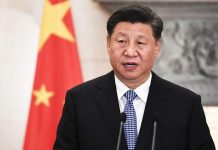Africa-Press – Mauritius. As 2023 draws to a close, 2024 already promises to be full of events.
Some of these events are predictable, others will appear as surprises throughout the year. In any case, the trends for 2024 are already set, and the political, economic and social perspectives will not change drastically. Some of these trends may even deepen over the coming months.
We are coming out of a year 2023 which saw a major economic recovery, with the consolidation of the real estate, tourism and financial sectors.
Moreover, Statistics Mauritius has just revised economic growth upwards for 2023, increasing it from 6.1% to 7%.
Thus, the Mauritian economy is entering a year 2024 which will be, let us remember, an election year, with certainties as to the fundamentals which are driving the country forward and with a significant reduction in the unemployment rate which has fallen below the 7 mark.
% at the end of the year.
But this figure of 7% growth, which is fabulous from an economist’s point of view, should not prevent us from seeing the problems we face.
Inflation was, for example, a little over 11% at the start of 2023, and projections from the Bank of Mauritius place inflation below the 6% mark at the end of the year.
.
We will have to wait for Statistics Mauritius to publish its report on inflation at the beginning of next year to have confirmation or not of this projection.
What is nevertheless certain is that Mauritian households suffered this year, even if we can see an improvement in purchasing power at the end of the year.
It must be said that the government has chosen to continue to let the Rupee slide slowly in order to allow the different sectors of the economy to maintain their global competitiveness.
A Rupee that was too strong would have been damaging, for example, for the tourism sector, with tourists choosing less expensive destinations for their vacations.
But the BOM’s policy has borne fruit from this point of view, allowing this sector, which is a major source of foreign currency, to refuel with the million tourist mark exceeded at the end of October.
Inflation has had a negative impact on the real estate sector, with a significant increase in raw materials, and therefore construction costs.
But the sector does not necessarily seem to be suffering from these cost increases. The implementation of PDS and Smart City schemes, but also other arrangements allowing land developers to sell their projects on the international market, continued to bear fruit in 2023, with a significant influx of investors and buyers. coming in particular from France, South Africa and Russia.
The real estate sector is expected to continue to grow significantly in 2024, especially as Mauritius seems to have been able to take advantage of its strengths on the international market: idyllic coastlines, social peace and economic and political stability.
In a world that will become more dangerous in 2023, preserving these fundamentals will help to further deepen the famous Mauritian resilience and will make Mauritius a country of refuge in the midst of a globalization that is becoming increasingly crazy.
The government has thus, it seems, prioritized the consolidation of economic recovery before implementing its redistribution policies.
The latest is obviously the increase in the minimum wage, which will be followed at the start of next year by the 10% salary increase. The old age pension should also increase to reach the promised Rs 13,500 within a few months.
These increases may seem insignificant given the rapid rise in the cost of living, but when we look more closely, there is a real increase in the flow of money that is put into household baskets.
The average household in Mauritius often includes a resident, two employees and a young person who has a small job. The increases in income from each of these categories therefore add up to form a real increase in purchasing power. It should not be neglected.
The electoral machinery on its way
The “timing” of these salary increases, or the implementation of these redistribution policies, is not trivial.
It is obviously for the Government to relieve the households most affected by the crisis of the cost of living, but it seems obvious that the electoral machinery of the MSM has been set in motion.
The year 2024 will be marked by the end of the current mandate in November and by general elections which will follow.
It could even be that these elections will be anticipated, and speculation will be rife about the potential date of the call to the polls.
Bookmakers are currently placing their bets on a snap election in April or May, which seems unlikely given that this will also be India’s general election.
On the other hand, we can speculate that the PM will use his privilege to call the country to the polls before the end of April or from mid-May.
What is certain is that an electoral climate will reign over the country once the euphoria of the end-of-year holidays has passed.
The MSM has already set its machinery in motion, and the opposition parties are doing the same. Even if they have not yet specified the terms of their alliance, the PTr-MMM-PMSD grouping has just published five measures that they will take in the event of victory.
It is a way for them, after the series of regional congresses they held during the second half of the year, to begin to feel the pulse of the electorate on certain issues.
It thus seems clear that the traditional opposition parties will rely on Pravind Jugnauth’s main weakness: the accumulation of affairs and scandals involving certain of his ministers and deputies.
Will this be enough?
Only the future will tell us, but the opposition would make a serious mistake to think that it is not obliged to move forward with a coherent program on the consolidation of economic and social achievements, and to a renewed vision of the Mauritian development model.
If it does not carry out this exercise, then the MSM will keep all the possibilities of pulling the rug out from under their feet because let’s not forget that Pravind Jugnauth has a major joker that Navin Ramgoolam, Paul Bérenger or Xavier do not have.
Duval: make a tabula rasa of his ministers and deputies and present an entirely renewed and rejuvenated team around him. Let us not forget that he has already been able to convince certain young intellectuals to join him while the PTr, the MMM and the PMSD would, it seems, have difficulties during the same exercise on their side.
Decline of democracy, advance of ultraliberalism and populism
Whatever happens, the year 2024 will be crucial for the country.
The next elections will set in place a historic sequence which will determine the very future of the Republic of Mauritius. Mauritius is a country that is an integral part of globalization, and global trends have a real influence on us, even if many Mauritians have difficulty perceiving it.
Thus, the decline of democracy, the advance of ultra-liberalism and the appearance of certain types of populism which are emerging almost everywhere across the world also find their correlate in Mauritian society.
A victory, for example, of the MSM in the next elections will consolidate the current economic and geopolitical directions, with an even more pronounced entry of the country into an ultraliberal system and an evolution of the parliamentary tradition.
It is global trends that dictate this, as much as the political will of the master of the day.
And from this point of view, the question is posed to the opposition:
(a) What will they propose in terms of economic orientations?
(b) Given the growing power of India and China in the Indian Ocean, what type of diplomacy will be favored within this alliance
(c) Since democracy is dying a little more every day in the world, what will be the trend locally if the PTr-MMM-PMSD trio comes to power?
Perhaps we will have answers to these questions in the “build-up” of the next elections.
But global trends are set and the fundamentals of the Mauritian economy are on track for these major upheavals.
We should not expect miracles in 2024, but undoubtedly a deepening of what has already taken shape in 2023.
Global outlook will definitely impact local business
It must first be noted that the year 2023 saw a significant increase in conflicts and, in this wake, situations of precariousness and security issues in the world.
The special operation carried out by Russian forces in Ukraine has gotten bogged down, as several experienced analysts predicted.
Indeed, the counter-offensive launched by Ukrainian forces to push back Russian forces has not had the expected effects, and some are already declaring that Ukraine has lost the war. Indeed, it seems that Russia has little left to do, apart from holding its positions until the Ukrainian army is physically and mentally eroded.
Moreover, splits have been appearing for a while within Ukrainian leaders, with tension becoming particularly palpable between Volodymyr Zelensky and some of his generals, notably the commander-in-chief of the Ukrainian armed forces, Valeri Zalouzhny.
This tension, this unease even, adds to a certain erosion of the Ukrainian people’s confidence in Zelensky. Erosion which also finds its correlate in a certain loss of interest of Western allies in terms of financial and military support.
Is it Ukraine that is gradually isolating itself, or is it Zelensky who is losing his footing? The year 2024 should give us a definitive answer to this question.
It must be admitted that the shift in Ukraine’s focus also comes from the Hamas attack on Israel on October 7, an attack which caused a resumption of the war in Gaza.
This reactivation of hostilities arose in a context where the main actors in the Middle East were working to normalize diplomatic, economic and security relations with Israel.
This was already the case for the United Arab Emirates, Bahrain, Sudan and Morocco, which were the first signatories of the Abraham Accords with Israel in 2020.
Negotiations were at a very advanced stage so that Saudi Arabia would also become a signatory to these same agreements, sending a de facto strong signal for the normalization of ties with Israel and for the construction of lasting peace in a region which is at the heart of global security since the end of the Cold War.
generalized geopolitical and security crisis
But all that was shattered with the Hamas attack and the Israeli response that followed.
Saudi Arabia, like Egypt and Qatar, still favor rapprochement with Israel, but the situation has become so tense that these countries risk going backwards, sending the Middle East towards a generalized geopolitical and security crisis.
This is already more or less the case, with Iran in particular taking advantage of the Gaza war to relaunch its nuclear enrichment program, in the process asking UN observers to leave the country.
Iran has also increased its production of enriched uranium from 3kg to more than 9kg, something which is normally prohibited in this country.
It should be noted that the Israeli army is absolutely not showing restraint, with airstrikes in Syria which killed Iranian general Sayed Razi Mousavi.
At the same time, the Houthi rebels, based in Yemen, took advantage of the start of the Gaza war to begin attacking merchant ships transiting the Arabian Sea. This situation has just forced Narendra Modi to deploy three Indian navy destroyers in the region in order to maintain a deterrent presence.
The situation has become explosive again in the Middle East and could tip into a situation which would lead the world economy into an inflationary spiral which is extremely dangerous for us in Mauritius.
But the Middle East is not the only place of safe warming.
The China Sea has also seen an increase in military threat, starting with the fact that Chinese President Xi Jinping has repeatedly affirmed that he will make the annexation of Taiwan the security and geopolitical priority. of his third term.
Since then, military exercises carried out by the Chinese navy at the gates of Taiwan’s ocean space have increased, with combat aircraft even entering Taiwanese airspace, thus also defying all principles of international law.
Some seasoned observers believe that Xi Jinping is bluffing on the Taiwan question and that in reality, he will not dare to attack, given Taiwan’s defense capabilities and the highly strategic support of the United States for Taiwan.
They even note that the annexation of Taiwan has become a political leitmotif in Xi Jinping’s speech in order to distract the Chinese from the slowdown in the Chinese economy.
Indeed, the latter is facing increasing difficulties since the end of the Covid-19 pandemic and the resumption of world trade.
The relocation of new technology giants, the shelving of certain “Belt and Road Initiative” projects, the extremely complex situation of the real estate bubble and the appearance of youth unemployment are all signs of a structural slowdown. of Chinese growth.
And who says economic slowdown, says criticism and questioning of the skills of the Chinese Communist Party (CCP) in a one-party system.
Xi Jinping thus played the card of patriotism and the reunification of imperial China in order to change the focus and remobilize the Chinese behind him.
But these threats should not be taken lightly.
An attack on Taiwan would send the entire region from the China Sea to the Sea of Japan, including the two Koreas and the Japanese archipelago, into a spiral of war that would force the American army to intervene, provoking a situation of frontal war. between the two greatest powers in the world.
The potential is so real that Japan, which has the only pacifist constitution in the world, is seriously discussing the repeal of Article 9 of its Constitution in order to be able to remilitarize as quickly as possible, something that was still unthinkable a long time ago.
a decade ago.
India’s “master plan”
Militarization: the word is out.
The production and sale of arms experienced exponential growth in 2023. Leading purchasing countries: India, which purchased nearly 13% of the arms and military equipment produced in 2023.
This significant increase in the Indian military budget is part of a strategy to reform the Indian army itself.
Indeed, the government of Narendra Modi has implemented a vast project to reform the Indian army, a reform which is progressing by leaps and bounds.
This reform provides for the restructuring of the military administration, with the creation of three distinct commands whose military objectives vary.
The already existing Western Command is based in Jaipur in Rajasthan and aims to manage the western border with Pakistan. This command will soon be followed by the Eastern Command, which will be based in Lucknow in the state of Uttar Pradesh, and whose objective will be to secure the Himalayan border with China.
The third and most important command will be based in Karwar in the state of Karnataka.
This third command will be the maritime command whose objectives will be dedicated to the defense of the Indian coastline and power projection capabilities in the Indian Ocean. When we know that 80% of world trade passes through the Indian Ocean, we easily understand the extent of the challenge.
What is India’s “master plan”? It is the securing of the Indian Ocean through the development of projection and defense capabilities that will allow it to establish its geopolitical ambitions in the region.
The Indian government also cooperates with the Americans, Europeans and Russians on arms and defense strategies.
The development of this projection capacity is also part of agreements made with India’s allies in the context of the Quad, and in the desire to reduce British and American military capabilities in the Indo-Oceanic basin.
The deployment of three destroyers in the Arabian Sea to counter the threat from the Houthis in Yemen already demonstrates Indian military ambitions and the role that Narendra Modi sees himself playing in the region.
This rise in power of India is inevitable and is part of a process of civilization which is itself part of a global movement which is currently seeing a significant redistribution of the cards of world geopolitics.
China, Russia and Saudi Arabia are caught in this same movement, and the extension of BRICS to other countries this year confirms the increasingly palpable emergence of a new world order which is gradually taking shape. little.
Towards a new world order
This new world order presents itself as much as the construction of alternatives to Western globalization and American hegemony over world trade, as the rise of a latent war for the control of energy resources or even as the promotion of new forms of cultural “soft powers”.
This new world order also takes another form: that of the slow but certain disintegration of the paradigm of representative democracy of the liberal type.
Indeed, current ultraliberalism is increasingly demonstrating that it does not need the model of democracy to function well.
Quite the contrary even. Global capitalism finds itself in a phase where the old alliance with liberal democracies is gradually giving way to a new alliance with authoritarian, even totalitarian, regimes.
The Chinese economic miracle has repeatedly demonstrated exactly this: contrary to the belief of 19th century liberals, capitalism does not need democracy to function well. Or rather, capitalism no longer needs democracy to function well.
The year 2023 also saw a definite decline in global democratic culture, even if this trend was already present previously.
Lula’s return to business in Brazil was encouraging, as was the election of Joe Biden in 2020. But it would be a serious error to see this as a return to favor of liberal democratic movements.
The world’s major economies are increasingly shifting towards very right-wing regimes, not to say authoritarian regimes, and the general elections in India in May 2024 and the American presidential elections in November 2024 should set the tone for what will happen next.
follow. Narendra Modi retains every chance of being reappointed as head of the Great Peninsula, barring an accident, and the American neoconservatives are more united than ever against a weakened Joe Biden who will have difficulty leading a tough and violent campaign.
The global outlook for 2024 is in any case set.
And they will have to be followed very closely and with great attention because they will have a certain impact on local affairs in Mauritius.
For More News And Analysis About Mauritius Follow Africa-Press







